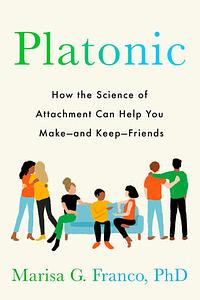Take a photo of a barcode or cover
803 reviews for:
Platonic: How the Science of Attachment Can Help You Make and Keep Friends as an Adult
Marisa G. Franco
803 reviews for:
Platonic: How the Science of Attachment Can Help You Make and Keep Friends as an Adult
Marisa G. Franco
hopeful
informative
inspiring
reflective
medium-paced
Goal for 2025, become a better friend.
I really enjoyed reading this book. Friendship is something I decided to want to work a bit more on, and this really helped. This book made me realise why some previous friendships (or not quite friendships yet) failed or didn't work out.
It gives some really good tips on things you can do, things that are relatively easy, to either make friend or become closer with friends you already have.
It finally gave me the push to be more vulnerable or open up about difficult things, and with some things that happened, I'm really glad I started reading when I did.
Time will tell how useful reading this book will be, but for now it's off to a great start.
I really enjoyed reading this book. Friendship is something I decided to want to work a bit more on, and this really helped. This book made me realise why some previous friendships (or not quite friendships yet) failed or didn't work out.
It gives some really good tips on things you can do, things that are relatively easy, to either make friend or become closer with friends you already have.
It finally gave me the push to be more vulnerable or open up about difficult things, and with some things that happened, I'm really glad I started reading when I did.
Time will tell how useful reading this book will be, but for now it's off to a great start.
3.5 stars
I’d recommend this book to anyone new to learning about attachment theory who wants deeper friendships. The first half of the book was a pretty basic primer on attachment theory and styles (which is a good foundation but I didn’t think added much to the discourse), and the second half covered everything from conflict to generosity and affection in friendships.
I think the best advice comes in the later chapters about mutuality and reciprocity. And this is where the attachment theory stuff became more applied and useful!
Key takeaways:
- secure people don’t view conflict as combat
- secure people operate assuming the best intentions of people and are treated in kind
- people like people they think like them too
- generous people are generous in ways that are mutually beneficial to them and their relationships
I’d recommend this book to anyone new to learning about attachment theory who wants deeper friendships. The first half of the book was a pretty basic primer on attachment theory and styles (which is a good foundation but I didn’t think added much to the discourse), and the second half covered everything from conflict to generosity and affection in friendships.
I think the best advice comes in the later chapters about mutuality and reciprocity. And this is where the attachment theory stuff became more applied and useful!
Key takeaways:
- secure people don’t view conflict as combat
- secure people operate assuming the best intentions of people and are treated in kind
- people like people they think like them too
- generous people are generous in ways that are mutually beneficial to them and their relationships
informative
inspiring
medium-paced
hopeful
informative
inspiring
reflective
medium-paced
informative
medium-paced
It was an interesting book about how to make friends and also went into the psychology of it. I especially liked the summary at the end of each chapter.
However, it was quite dry and hard to focus on in places. A decent book and it should generate a good discussion at book club.
However, it was quite dry and hard to focus on in places. A decent book and it should generate a good discussion at book club.
hopeful
informative
inspiring
medium-paced
I cried! So much! Friendship is so lovely and I would be a fool to pretend it isn’t the greatest joy of my life.
Marisa Franco offers research-supported tips on how to make and keep friends in an accessible and enjoyable way covering everything from taking initiative, overcoming conflict and expressing affection.
Some neuroscience and psychology mixed with history and anecdotes, Platonic: How the Science of Attachment Can Help You Make Friends is mostly a self-help book for those who wish to make friends and maintain meaningful friendship in adulthood. No, it’s not another Dale Carnegie’s How to Win Friends and Influence People. Years ago I read Carnegie and hated it. It reeks of emotional manipulation. Franco’s book is different, much more sincere. Yet I find it lackluster. Nothing is new to me. Perhaps I am not the intended audience.
I agree with the author that the decline of intimate friendship in our modern world is unfortunate, but I don’t think homophobia alone can explain it. It’s the rise of hypersexuality, both hetrosexual and homosexual, that causes friends to avoid physical proximity.
I always have close friends. Back in my school days, I often got frostbites on my fingers in winter. I remember holding my friend’s hand. Her hands were soft and warm, while mine were cold and fingers swollen like carrots. She always smiled at me when I took her hands in mine. It was a source of comfort and strength. In high school I wrote a passionate love prose poem to a friend, whom I greatly admired and envied. I wanted to be with her and BE her. None of these were sexual. They are among my fondest memories.
I agree with the author that the decline of intimate friendship in our modern world is unfortunate, but I don’t think homophobia alone can explain it. It’s the rise of hypersexuality, both hetrosexual and homosexual, that causes friends to avoid physical proximity.
I always have close friends. Back in my school days, I often got frostbites on my fingers in winter. I remember holding my friend’s hand. Her hands were soft and warm, while mine were cold and fingers swollen like carrots. She always smiled at me when I took her hands in mine. It was a source of comfort and strength. In high school I wrote a passionate love prose poem to a friend, whom I greatly admired and envied. I wanted to be with her and BE her. None of these were sexual. They are among my fondest memories.
Dr. Marisa G. Franco offers specific, research-based ways to improve the number and quality of your connections using the insights of attachment theory and the latest scientific research on friendship. As a single, childfree person in their thirties, my friendships are very important to me and so I was very interested to read this book. It has some good research, solid advice and some helpful takeaways.
However, I found the book somewhat tedious at certain points.
ND Women Connect Book Club June 2024
However, I found the book somewhat tedious at certain points.
ND Women Connect Book Club June 2024





